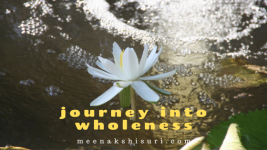Heal the Person: Not the Illness
Healing starts in the presence of the healer
To heal means to become whole.
To re-connect one’s self.
As we grow in human life, we learn to fragment ourselves, to disassociate with the internal, non-logical, painful aspects of life, and this causes us to be at odds with ourselves.
So we may have our “head” [read “reason”] warring with our “heart” [read “feelings”].
Our promises to ourselves warring with our unhealthy habits.
Try to feel with the mind and think with your heart.
Who can heal you when you are overwhelmed?
The answer is: a therapist, a healer, a doctor, an experience…
A deeper answer is: when you meet someone who helps to awaken your inner healer.
The whole answer is: yourself.
How can healing begin?
When you seek out a healer. When you begin to make a choice to be healed.
Sometimes, it is taken out of our control when we have an accident. But even in this case, it is conditions within ourselves that have reached a breaking point that can cause accidents to occur.
Healing begins with a choice we make: conscious or unconscious.
You are your own healer. Make the choices that will help you to become more self-empowered. Meet teachers and therapists who will help you to be more self-reliant.

A great part of healing, that is difficult to understand, is that we have to come from a space of wholeness- and in that space, no one is unwell. From that space, we view the request of someone for healing as a call to connection; not a call to cure/remove/improve
Healers focus on the patient
as a person, not on the illness.
The next step is not always in our hands.
Some healers focus on the illness as a problem, and attack it. The illness may go, but peace of mind also goes. Testing procedures, visits to the clinic or hospitals, medication with side effects: all become sources of stress.
One dis-ease is replaced by another.
The healing professional needs to focus on empowering the healee.
When we visit a healer– whether the kind of healing used is allopathic, homeopathic, or any of the other ‘alternative’ forms of energy or other healing –we feel calm in the presence of the healer. Even if the illness is diagnosed as something that is serious, we come away with a feeling that the healing has begun. If we are involved in our healing, if the healing professional listens to us, asks questions, seems to understand and respect us, we feel empowered even if we are otherwise incapacitated.
The healer and healee form a circle of healing
- Does illness serve a purpose?
- Is ‘alternative medicine’ viable? That is, can it replace modern medicine?
- For much of the world, “alternative” methods of healing are the ancient, established ones, that have stood the test of time!
~~~~~~~~~~~~~~
Sometimes the words of another are healing!
Meenakshi,I can’t tell you how much your thoughts and observations seem to be so “on the mark”, and mean so much to me.
I thought about what you just wrote, and I love it. Because we all come from the same source; we are all one. The call to be ‘connected”…instead of” healed’. I think this thought will change my approach to others , and to myself, hopefully for a long time.
In Reiki, I was always taught that we do not do the healing, we are just the instrument for the energy. But always there was the thought of unwell vs. well. Thinking now, that I am the instrument to aid in the ‘connection’, is such a wonderful way of thinking, and will help me to stay above the worlds of duality.
Thank you so much for your insight, and for your loving light.
[This is not holistic!] Examples from healing where the illness and patient and even parts of the body were seen as separate from the whole. Discomfort, distress, and tragedy result from seeing the patient as a “problem” rather than a “person with a problem”.
© 1997 Meenakshi Suri



Pingback: You are whole | Journey to Wholeness